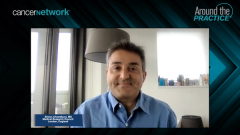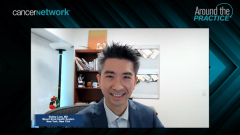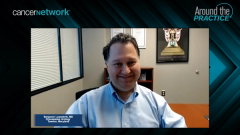
Metastatic CSPC: Rationale Behind ADT + Apalutamide Therapy
Expert oncologists review the selection of apalutamide + androgen deprivation therapy in this patient scenario of metastatic castration-sensitive prostate cancer.
Episodes in this series

Transcript:
Neeraj Agarwal, MD: I’ll come to Simon now and ask, why did you choose ADT [androgen deprivation therapy] plus apalutamide from the perspective of quality of life? Second, all these trials have reported quality of life data; how do you discuss these data with your patients with metastatic castration-sensitive prostate cancer?
Simon Chowdhury, MD: These are critical talking points. We look at the studies, we look at personal experience, we look at the patient in front of us, and I think sometimes we underestimate how scary it is for a patient faced with metastatic disease, to be faced with a terminal life-changing illness. Patients like this want the best treatment. Androgen deprivation therapy works and works well, it’s a very active treatment; it’s one of the most active treatments we have in solid tumor oncology. We focus on the current rather than thinking about what’s coming for the patient in a relatively short time, and we see that PFS [progression-free survival] on ADT alone from all the studies is 12 to 18 months and shorter in terms of PSA [prostate-specific antigen], which obviously drives decision-making anxiety and treatment change.
What I discuss with them are the data that are out there. I think I do have biases because I worked on the TITAN trial with you. You published a very robust, beautiful article in Lancet Oncology showing quality of life is maintained with no significant differences with the addition of apalutamide to ADT. I honestly believe ADT is the main elephant in the room here; it’s the main toxicity. I think certainly in the United Kingdom, we underestimate that toxicity to the detriment of our patients. Going forward, particularly in patients with lower volume disease and good responses, I’m hoping we’re going to see the escalation of therapy, particularly ADT, and get men possibly on single-agent AR [androgen receptor] inhibitors, although that is not licensed. That’s a question we need to answer, but PSA controlled with normal testosterone and with all the advantages of normal testosterone in terms of sexual function, cardiac, metabolic, psychological, and many others as well. That’s how I see it, I look at the data within that.
I think one of the things that we’ve talked about quite a lot, and there’s been quite a lot of work done, is the fact that these studies, particularly the studies such as TITAN, ARCHES, and the ARASENS study, you may well discuss later, PSA was blinded to patients and investigators. That benefit in PSA psychologically is massive for patients. We will all know the 4 of us that when patients walk into our clinic room, one of the first, if not the first, question is; “how is my PSA, doctor?” If the PSA is undetectable, I know that you, Ben and Bobby will have a much shorter, much easier consultation than if it’s going up. I think PSA is critical, and the PSA responses, the depth, the duration, and how that also ties in with quality of life is really important. For me, I think apalutamide and enzalutamide are both good drugs. I chose apalutamide because of my experience with TITAN.
Neeraj Agarwal, MD: These were wonderful points, thank you.
Transcript edited for clarity.
Newsletter
Stay up to date on recent advances in the multidisciplinary approach to cancer.












































